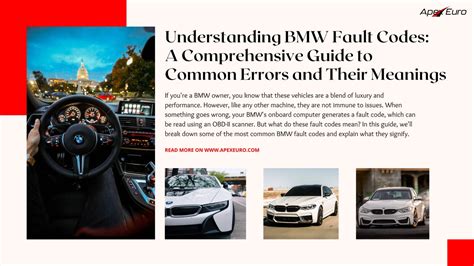When owning a BMW, the joy of driving can sometimes be overshadowed by common errors that may arise. This comprehensive guide aims to illuminate the frequently encountered issues BMW owners face, from electrical glitches to engine performance concerns. Understanding these common errors not only helps enhance your ownership experience but also empowers you to address potential problems before they escalate. In this article, we’ll explore essential insights into BMW common errors, offer preventive maintenance tips, and provide guidance on diagnosing these issues effectively. Whether you’re a long-time BMW enthusiast or a new owner, this guide will equip you with the knowledge you need to navigate the complexities of BMW maintenance and ensure your vehicle remains a reliable companion on the road. Dive in to discover how to keep your BMW in top shape and drive with confidence.
Overview of BMW Common Errors to Watch For
As a luxury car brand, BMW is renowned for its performance, engineering, and cutting-edge technology. However, like any vehicle, BMWs can experience a range of common errors that can impede their functionality. Understanding these errors is crucial for maintaining the efficiency and longevity of your vehicle. In this BMW common errors guide, we’ll outline some of the most frequent issues BMW owners might face, enabling you to recognize potential problems early and seek appropriate solutions.
Common errors in BMW vehicles can often manifest in various systems, such as electrical components, engine performance, and transmission functionality. It is essential for owners to be aware of signs indicating something may be amiss in these critical areas.
Moreover, proper maintenance and timely interventions can help mitigate the risks associated with these common errors. Regular vehicle checks, adhering to maintenance schedules, and utilizing the services of qualified professionals can enhance your driving experience and reduce the likelihood of encountering major faults.
By remaining vigilant and informed about these common errors, BMW owners can take proactive measures to ensure that their vehicles run smoothly and efficiently, ultimately enhancing their time behind the wheel.
Common Electrical Issues in BMW Vehicles
Electrical issues are one of the most prevalent problems faced by BMW owners. These issues can affect various systems in the vehicle, leading to inconvenience and potential safety hazards. Here are some common electrical problems encountered in BMW vehicles:
- Battery Drain: This is a common concern, often resulting from faulty wiring or components that draw power even when the vehicle is off.
- Faulty Alternators: Alternator failure can lead to insufficient power supply, causing various electrical components to malfunction.
- Malfunctioning Sensors: Sensors that fail can trigger warning lights on the dashboard and affect vehicle performance.
- Lighting Issues: Problems with headlights, taillights, or dashboard lights can arise from blown fuses, defective wiring, or bad bulbs.
- Software Glitches: Modern BMWs are heavily reliant on software for many functions. Glitches or outdated software can lead to inconsistencies in performance and warning signals.
Identifying these electrical issues early is important as they can escalate and lead to more significant problems down the line. Regular maintenance checks are advised to ensure the electrical systems are functioning correctly as part of the BMW common errors guide.
Investing in quality replacement parts and keeping the vehicle’s software updated can prevent many of these issues. When in doubt, consulting with a qualified BMW technician can help pinpoint the problem and offer effective solutions.
Engine Performance Problems: Insights and Solutions
Engine performance issues are among the most frequently reported BMW common errors. These problems can manifest in various ways, such as rough idling, unusual noises, decreased fuel efficiency, or a substantial loss of power. Understanding these issues can help BMW owners address them proactively and preserve the longevity of their vehicles.
Common causes of engine performance problems in BMW vehicles include:
- Fuel System Issues: Clogged fuel filters or a failing fuel pump can restrict fuel flow, leading to poor engine performance.
- Ignition System Failures: Worn-out spark plugs or faulty ignition coils can cause misfires and uneven power delivery.
- Air Intake Problems: A malfunctioning mass air flow sensor or a dirty air filter can disrupt the air-fuel mixture, affecting engine performance.
- Exhaust Blockages: A damaged catalytic converter or exhaust leak can hinder engine efficiency and increase emissions.
- Electronic Control Unit (ECU) Issues: Software or sensor malfunctions can lead to poor engine management and performance challenges.
To diagnose and resolve these engine performance issues effectively, consider following these steps:
- Regular Maintenance: Adhering to a preventative maintenance schedule, including oil changes and spark plug replacements, can mitigate many common problems.
- Utilize Diagnostic Tools: Employ an OBD-II scanner to read any error codes generated by the engine’s ECU, which can provide insights into performance issues.
- Check for Vacuum Leaks: Inspect the vacuum lines for any leaks that might affect the air-fuel mixture.
- Monitor Fuel Quality: Use high-quality fuel and keep an eye on fuel additives to avoid contaminants that can impact performance.
- Consult with Professionals: For complex issues, seeking professional help from a certified BMW technician can save time and prevent further damage.
Addressing engine performance problems early can not only enhance driving experience but also reduce the likelihood of more severe issues down the line. By following the suggestions outlined in this BMW common errors guide, owners can ensure that their vehicles operate efficiently and reliably.
Transmission Errors: Causes and Fixes
Transmission issues are among the more critical BMW common errors guide owners should be aware of. Understanding the potential problems and their fixes can save both time and money in the long run.
Here are some common causes of transmission errors in BMW vehicles:
- Low Transmission Fluid: Insufficient fluid can lead to slipping gears, rough shifting, and overheating.
- Worn Transmission Components: Over time, parts like clutches, bands, and gears can wear out, resulting in inefficient operation.
- Electronic Malfunctions: Modern BMWs rely on electronic systems for transmission control. Faulty sensors or software issues can cause erratic behavior.
- Overheating: High temperatures can damage the transmission fluid and components, leading to performance issues.
To fix these transmission errors, consider the following solutions:
- Regular Fluid Checks: Maintain proper fluid levels and ensure the fluid is clean to help optimize transmission performance.
- Component Inspection: Regularly inspect and replace worn-out components to prevent major failures.
- Software Updates: Keep your vehicle’s software up to date to prevent electronic malfunctions.
- Overheating Prevention: Address any cooling system issues promptly to avoid damage to the transmission.
By being proactive and attentive to these issues, you can manage your BMW’s transmission problems effectively, ensuring a smoother driving experience and extending the life of your vehicle. Regular maintenance and being informed are key components of the BMW common errors guide.
BMW Common Errors Guide: Preventive Maintenance Tips
To avoid encountering BMW common errors, proactive maintenance is essential. Here are some effective preventive maintenance tips that can help you extend the lifespan of your vehicle and minimize potential issues:
- Regular Oil Changes: Ensure that you change the engine oil and filter as recommended by BMW. Clean oil maintains engine efficiency and prevents wear.
- Inspect and Replace Filters: Air and fuel filters should be checked regularly. A clogged filter can affect performance and fuel efficiency.
- Check and Maintain Fluid Levels: Regularly examine coolant, brake, power steering, and transmission fluids. Top off as necessary and replace fluids according to your maintenance schedule.
- Monitor Tire Health: Keep an eye on tire pressure and tread depth. Properly inflated and well-maintained tires not only improve safety but also enhance fuel efficiency.
- Brake System Maintenance: Inspect brake pads and rotors regularly. Address any issues immediately to prevent further damage and ensure safety.
- Regular Software Updates: BMW vehicles come equipped with advanced software. Ensure your vehicle’s software is updated to address any underlying bugs or glitches.
- Scheduled Inspections: Follow the BMW maintenance schedule for inspections. These can uncover potential issues before they develop into significant problems.
- Use Genuine Parts: When replacements are needed, always opt for OEM (Original Equipment Manufacturer) parts. They are specifically designed for your BMW and help maintain performance.
- Driving Habits: Adopt smoother driving habits to reduce wear and tear. Avoid aggressive acceleration and braking, which can strain various components.
- Keep It Clean: Regularly wash and wax your BMW to protect the paint and metal from rust and corrosion.
By implementing these preventive maintenance tips from the BMW common errors guide, you can help ensure your vehicle runs smoothly and efficiently, reducing the likelihood of costly repairs down the line.
Identifying Warning Signs of BMW Failures
Recognizing the early warning signs of potential failures in your BMW can significantly reduce the risk of costly repairs and enhance the longevity of your vehicle. Here are some crucial indicators to watch for:
- Dashboard Warning Lights: Pay close attention to dashboard warning lights, including the check engine light, oil pressure warning, and battery warning. These lights are your vehicle’s way of signaling issues that require immediate attention.
- Unusual Noises: Listen for any strange noises such as knocking, grinding, or whining during operation. These could signify underlying problems with the engine, transmission, or other critical components.
- Changes in Driving Behavior: If you notice changes in acceleration, steering response, or braking efficiency, these alterations can indicate potential issues that need to be evaluated.
- Fluid Leaks: Spotting unexpected fluid spots under your vehicle can be a sign of leaks. Check for oil, coolant, or transmission fluid leaks, as they can point to serious issues if not addressed promptly.
- Frequent Overheating: An engine that frequently overheats may indicate problems with the cooling system. Make sure to monitor your temperature gauge and take action if it consistently approaches the red zone.
- Strange Smells: Be alert for any unusual smells, such as burning rubber or oil, which could signal mechanical problems that require immediate attention.
- Declining Fuel Efficiency: A sudden drop in fuel efficiency may suggest engine problems or maintenance needs. Keeping track of your fuel consumption can help spot this early warning sign.
By staying vigilant for these warning signs and regularly consulting a BMW common errors guide, you can identify potential issues before they escalate into major, costly repairs. Timely intervention is key to maintaining your BMW’s performance and reliability.
Common BMW Error Codes and Their Meanings
Understanding the BMW common errors guide involves recognizing the error codes that may appear on your vehicle’s dashboard or during diagnostics. Each code serves as a clue to diagnosing and rectifying specific issues within various systems of your BMW. Below is a table summarizing some of the most common error codes and their meanings:
| Error Code | Meaning |
|---|---|
| P0011 | Camshaft Position A Timing Over-Advanced or System Performance (Bank 1) |
| P0300 | Random/Multiple Cylinder Misfire Detected |
| P0455 | Evaporative Emission Control System Leak Detected (Gross Leak) |
| U0100 | Lost Communication with Engine Control Module (ECM) |
| P0171 | System Too Lean (Bank 1) |
| P052B | Oil Pressure Performance Problem |
Be aware that while some codes may indicate simple fixes, others could signify more severe issues requiring immediate attention. It’s advisable to consult a certified mechanic if you encounter persistent error codes, and ensure you’re referring to the BMW common errors guide for further assistance.
How to Diagnose BMW Common Errors Effectively
Diagnosing common errors in BMW vehicles requires a systematic approach to ensure that issues are identified accurately. Follow these steps to effectively navigate through the complexities of the BMW common errors guide:
1. Utilize Diagnostic Tools: Begin with a professional-grade diagnostic scanner that specifically supports BMW models. These tools can communicate with your vehicle’s onboard computer, retrieving error codes that help pinpoint malfunctions.
2. Check the Error Codes: Once you have scanned your vehicle, pay attention to the error codes displayed. Refer to BMW’s official documentation or a reliable diagnostic code database to interpret the codes accurately.
3. Perform Visual Inspections: After retrieving the codes, perform a thorough visual inspection of the vehicle. Look for signs of wear, frayed wires, or leaks that may be a symptom of the problems indicated by the codes.
4. Monitor Symptoms: Keep track of any unusual behaviors in your BMW, such as changes in engine performance, unusual noises, or warning lights. Document these experiences as they may help in diagnosing the issue more effectively.
5. Consult Technical Service Bulletins (TSBs): BMW often releases TSBs that address common issues found in specific models. Checking these can provide insights into potential errors and recommended fixes.
6. Engage With Online Communities: Many BMW owners share their experiences in forums and social media groups. Engaging in these communities can provide valuable insights into diagnosing issues and learning from others’ experiences.
7. Seek Professional Help When Necessary: If you are unable to diagnose the problem after conducting your assessments, consult a certified BMW technician. Their expertise can save you time and ensure that the diagnosis is accurate.
By following this structured approach, you can effectively diagnose problems and minimize the impact of common issues associated with BMW vehicles. This knowledge can also empower you to better utilize the BMW common errors guide for preventative maintenance and repairs.
Real-Life BMW Common Errors: User Experiences
When it comes to owning a BMW, many enthusiasts have shared their stories regarding the BMW common errors guide. Real-life experiences often highlight the practical challenges faced by drivers and the solutions they discovered. Here are some notable user accounts that shed light on common issues:
These anecdotes underline the importance of staying informed and proactive. By leveraging resources such as the BMW common errors guide, BMW owners can navigate potential issues effectively and maintain their vehicles in optimal condition.
Final Thoughts on Managing BMW Common Errors
Managing BMW common errors guide calls for a combination of proactive maintenance, timely diagnostics, and understanding of the vehicle’s specific needs. The complexity of BMW vehicles means that awareness of potential issues can save you time, money, and stress in the long run. Regularly schedule inspections and listen for any unusual sounds or changes in performance. Being vigilant can help you catch problems early and avoid more extensive damage.
Additionally, consider investing in quality diagnostic tools and consider joining forums or communities dedicated to BMWs. These resources can offer valuable insights and firsthand experiences from other BMW owners, enhancing your knowledge of potential errors and effective solutions. Ultimately, making informed decisions and taking preventive measures will not only improve your vehicle’s reliability but also enhance your overall driving experience.
Remember, routine maintenance and being proactive about the common issues outlined in our BMW common errors guide will keep your vehicle performing at its best. Stay informed, and drive with confidence knowing that you’re actively managing your BMW’s health.
Frequently Asked Questions
What are some common errors that BMW owners might encounter?
Common errors include electrical issues, transmission problems, engine warning lights, coolant leaks, and issues with the fuel system.
How can I prevent common BMW errors?
Regular maintenance, including oil changes, inspections, and following the manufacturer’s service schedule, can help prevent many common errors.
What should I do if my BMW’s check engine light comes on?
If the check engine light comes on, it’s important to have the vehicle diagnosed with an OBD-II scanner to identify the specific issue and address it promptly.
Are there specific models known for more frequent errors?
Yes, certain models, such as the BMW 3 Series and 5 Series, have been reported to have more frequent electrical and transmission-related issues.
How much can it cost to fix common BMW errors?
The cost of fixing BMW errors can vary widely depending on the issue, but repairs can range from a few hundred to several thousand dollars, especially for complex problems.
Is it advisable to perform DIY repairs on BMW vehicles?
While some minor repairs can be performed DIY, it’s advisable to consult a professional for complex issues to avoid further damage and ensure proper repairs.
Where can I find reliable information about BMW errors and repairs?
Reliable information can be found in BMW owner forums, official service manuals, and by consulting certified BMW mechanics.













